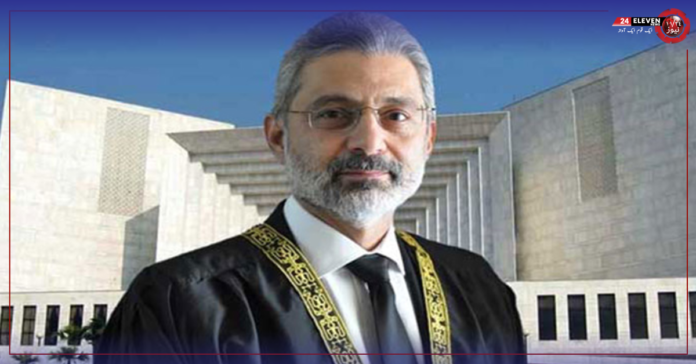The Supreme Court of Pakistan (SCP) concluded all matters related to the upcoming general elections within 90 days and officially set the election date as February 8.
In the court proceedings, the Election Commission of Pakistan (ECP) submitted records of conversations between President Arif Alvi and ECP Chief Election Commissioner Sultan Sikandar Raja, which were relevant to the case of conducting general elections within the constitutionally mandated timeframe.
Attorney General Mansoor Awan appeared in the Supreme Court and assured that meeting minutes between the President and ECP would be presented. The Chief Justice of Pakistan (CJP) inquired about the timeline for producing the document, to which the Attorney General stated it would take approximately half an hour.
After a brief recess, the Election Commission officials returned to the Supreme Court with the meeting minutes and provided records of their communication with the President. According to the documents submitted, the ECP had proposed February 11 as the date for the general elections to President Dr. Arif Alvi.
The CJP then sought confirmation of the President’s signature on the document, indicating mutual consent for the February 8 election date. The Attorney General informed the court that the President had issued his consent letter separately.
The CJP inquired about the location of the consent letter, and the Attorney General indicated it would also be presented before the court. Noting the importance of avoiding ambiguity, the CJP emphasized the court’s commitment to ensuring that the constitutional requirements held general elections.
During the hearing, various officials and lawyers, including those representing political parties like the Pakistan Tehreek-e-Insaf (PTI) and Pakistan People’s Party (PPP), were present in the Supreme Court. PTI lawyer Ali Zafar argued that elections must be held promptly per the Constitution’s provisions and stressed the significance of setting an election date.
The CJP expressed concerns that the plea for elections within 90 days needed to be more effective. The PPP was also permitted to join the case.
Ali Zafar argued that if the President dissolves the assembly, he must announce an election date within 90 days. The Chief Justice inquired whether the President needed to consult with the Prime Minister to determine the election date. Ali Zafar explained that consultation with the Prime Minister was unnecessary as the President had a constitutional obligation to set the date.
Justice Athar Minallah sought clarification regarding whether the President had already specified an election date. Ali Zafar stated his belief that the President had, but the Election Commission of Pakistan argued it was not within the President’s authority.
Justice Minallah emphasized the clarity of the Constitution’s mandate, asserting that the President must decree the election date, and there should be no dispute about this.
The CJP asked if the PTI lawyer wanted the court to take action against the President. The President had requested guidance and consultation from the court. Justice Minallah noted that everyone involved, including the government, the ECP, and the President, shared responsibility for the election delay. Now, the primary concern was the timing of the upcoming elections.
The CJP inquired whether the ECP had consulted with the President to determine the election date. Justice Minallah highlighted that the government, the ECP, and the President were all responsible for the delay in the elections. He stressed that with each day beyond the stipulated 90-day period, the Constitution was being violated, raising concerns about invoking Article 6.
The court ordered the ECP to consult with the President regarding the election date. The CJP emphasized that the court would enforce the finalized date once it was decided upon, binding the ECP to act accordingly.
Political parties, including the PTI, PPP, Pakistan Muslim League-Nawaz (PML-N), Muttahida Qaumi Movement (MQM), Jamiat Ulema-e-Islam (JUI), and Awami National Party (ANP), responded to the announcement of the general election date, expressing their opinions and reactions. The court’s decision to direct the ECP to finalize the election date has evoked a range of responses and actions from various political parties.
This development provides clarity and initiates the election process as political parties prepare for the upcoming general elections on February 8, 2024.
For More Updates Stay Tuned to our website 24Elevennews.tv


